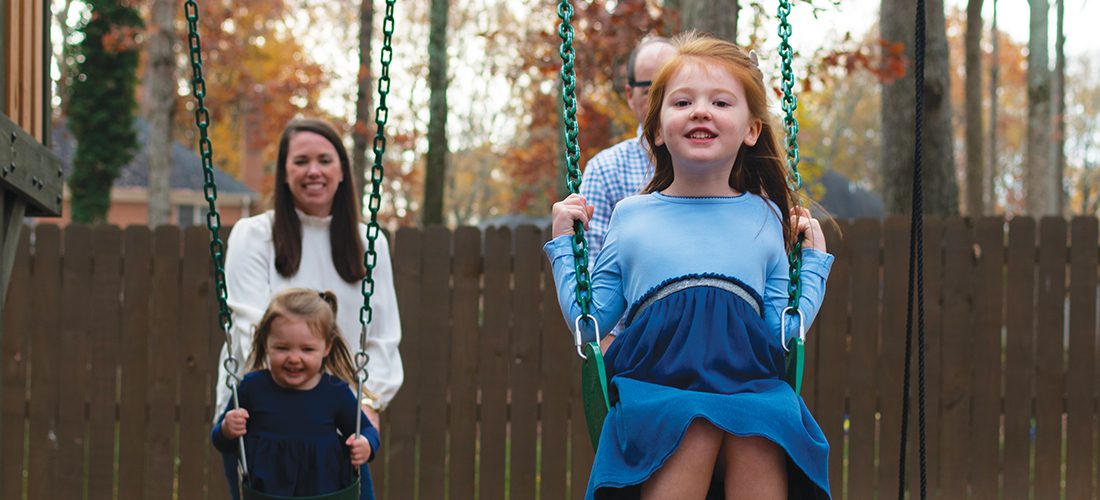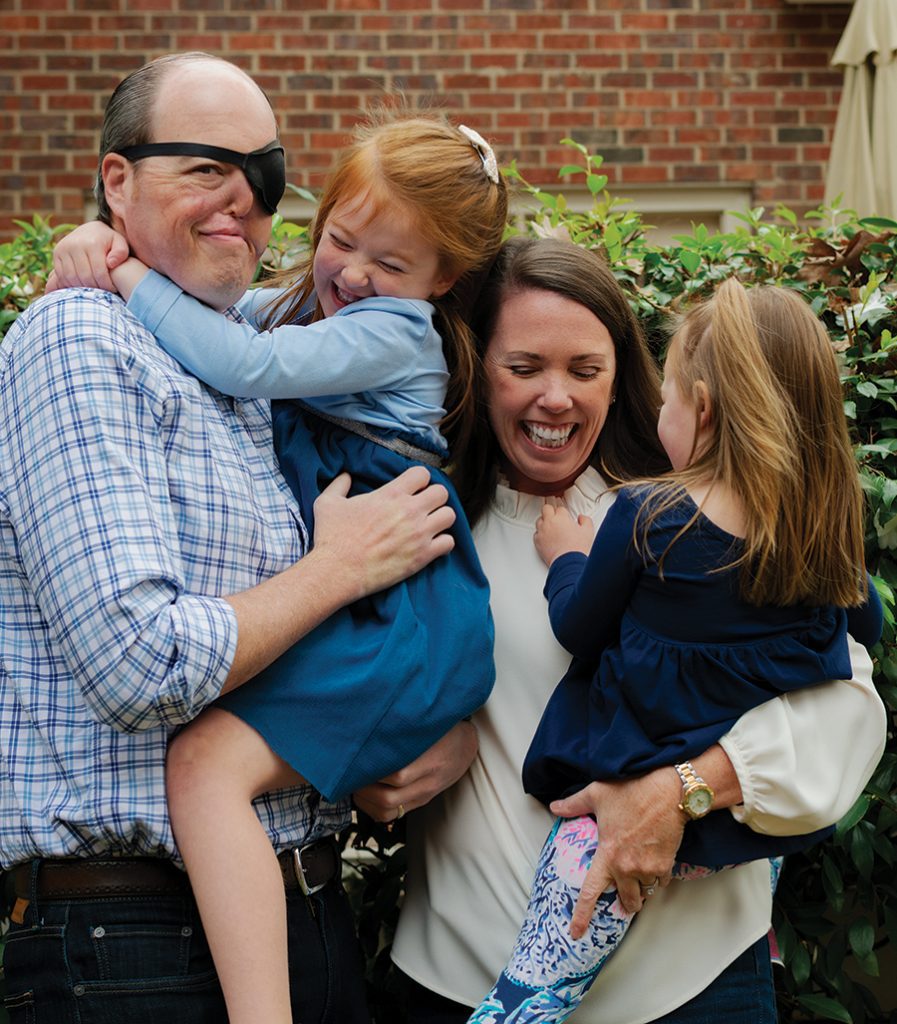Learning how to heal
January 1, 2022

After an aggressive cancer took his left eye, Matt McKenzie learned to accept help during recovery — and get back out there.
by Katie Toussaint Thurston | photographs by Miranda Martin
Healing is hard, no matter what you’re recovering from. Maybe you’ve lost someone you love, and you’re so bogged down by grief that you’re stuck everywhere else, from your career to relationships. Perhaps you had knee surgery and you feel like a shadow of yourself without your active lifestyle — or your ability to simply walk down the hall. Maybe you’ve been so hurt or sick that you’ll never move, or look, the same again.
Help — to get back out in the world, to move forward with your life — doesn’t always come from one person. After seven surgeries, 12 rounds of chemo, 75 rounds of radiation and 10 rounds of immunotherapy, Matt McKenzie can speak to that better than most. Matt, a business communications consultant and a longtime local beer writer, was diagnosed with squamous cell carcinoma in 2018 after the tiniest sore appeared in his nose. It was right before his second daughter was born.
The three years that followed have been marked by aggressive tumors, more aggressive surgeries, and treatments away from home at Atrium Health Wake Forest Baptist in Winston-Salem. On top of that, there’s been a long road to recovery, parenting and keeping up with work.
The cancer left a permanent mark on him: It took his left eye and half of his nose.
“It takes a lot for me just to go out every day,” says Matt, 44. “When you’re 6-foot-5 with an eye patch, you’re going to stand out no matter what. You know you’re going to get stared at. I would stare at myself.”
Lately, though, Matt’s been out for football games with friends, brewery gatherings with old acquaintances and a trip to Asheville to celebrate seven years of marriage to his wife, Allison. He’s getting used to wearing the eye patch and waving when his young daughters’ friends shout, “Hey, Mr. Pirate!”
“You can’t be a shut-in forever,” Matt says. “At some point, voluntary or involuntary, you’ve got to face the world.”
What helped him through the toughest times, including depression, were specific people: His wife, his therapist, his friends — and even complete strangers.
“Go do what you love to do.”
One of the first steps toward healing came when he started hearing — and believing — his wife’s words. Allison encouraged him to stop avoiding going out because he’s ashamed of the way he looks, or because he’s worried that she’s embarrassed by him. “That’s all in your head. If people look, then they look,” she told him.
“My wife was so supportive in getting me out,” Matt says. “Any husband would love to hear this: ‘I’m giving you a pass. Go be with your friends, go drink a beer, go do what you love to do,’” she told him.
At home with the kids, now 3 and 5 years old, Allison helped open conversations about how all families are different. She bought the books Wonder by R.J. Palacio and All Are Welcome by Alexandra Penfoldfor nighttime reading. This past Halloween, she even scored an inexpensive Batman costume from a Facebook moms’ group so Matt could trick-or-treat with the girls in proper form. It was fitting, since he’s a huge fan of superheroes, plus Star Wars and The Avengers.

“I want to be Superman to my daughters,” he says. “I want to show them that you can overcome things.”
“Breathe.”
Matt started overcoming his battle with the depression brought on by cancer when he found a therapist who specializes in cancer trauma. Because head-and-neck-cancer support groups didn’t meet in person during the pandemic, Matt sought someone else who had experience with what he was going through, rather than keeping it all in his head.
“You can’t feel sorry for yourself,” Matt says. “Trust me, I did. I had my moments.” He started journaling as part of therapy. “Journaling my worries, my fears, putting it out there, being honest with myself: How much this sucks. How I’m mad at the whole situation. I just started my life with the person I love the most, and we created two beautiful human beings that I want to see grow up.” He tried on different affirmations and started leaning into one word when days got overwhelming: “Breathe.”
Take in every kind word.
An onslaught of positive words came in the form of phone calls and notes from friends, too. When Matt was in the hospital for a month after eye surgery, Allison urged his friends to write cards. When she couldn’t be there because of work and child care, they made sure Matt had a card for each day of recovery. And he made sure to read every one.
“Every day I looked forward to that,” Matt says. “There’s not a word invented in the English language, there’s not an adjective that I could use, to describe what Allison’s meant during all of this.”
Matt was surprised to see social media turn into a conduit for supportive messages, too. He received a flurry of notes from people who knew him from his beer bylines or his snarky tweets. The messages were simple, along the lines of, “I just want you to know I’m thinking about you,” but they made an impact.
“All that means a lot,” Matt says. “Especially when you’re in that hospital bed and you’ve got tubes sticking out and you’re getting shots and your head’s spinning.”
“Immerse yourself.”
Matt learned that what it all comes down to is choosing to lean on people while you heal — choosing not to be alone.
“Don’t be afraid to accept help,” Matt says. “Anybody will say — my wife, my mom — [that] I’m the most stubborn person alive. But you just learn to accept.”
And when it’s time to get back out there? To go out to dinner when you’re clunking around on crutches? To smile through a sports game when you’re at your lowest? Or to take your kids to a birthday party when you’re wearing an eye patch?
“It’s kind of like jumping into a cold pool,” Matt says. “You’ve just got to do it. Immerse yourself. Especially if you were invited, they want you there — they don’t care, whatever it is. They’re happy you’re here.”
It helps a little that Matt’s been covering the Charlotte craft beer scene for more than 10 years, so he knows where to immerse himself. Since he’s an impartial journalist, he’ll just hint that you’ll likely find him enjoying pints from longtime local breweries like Olde Mecklenburg, NoDa, Birdsong and Triple C, as well as at newcomers like Divine Barrel and Resident Culture.
And while getting out and about might not make the healing process easier, it makes living life feel possible again.
“Trust me, I still get caught up in the small stuff every day,” says Matt, who got clear scans for the second time this past December. “It’s hard not to, because you want to live your life. But you also realize it’s a part of you now, and all you can do is move forward.” SP